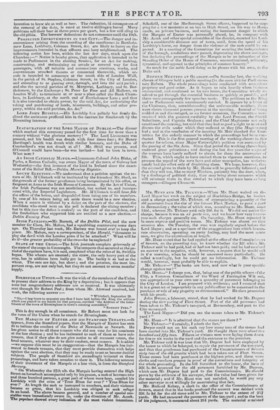INAUGURATION OF THE LORD MAYOR OF DUELIN.—The dinner which marked
this ceremony passed for the first time for more thee a century without "the glorious memory ! " The Lord Lieutenant was present, and his health was drunk with four times four ; Sir Henry Hardinge's health was drunk with similar honours, and the Duke of Cumberland's was not drunk at all ! Mr. Shiel was present, and O'Connell would have been—he was invited— had he been in town. What next ?
A sr Inn!' CATHOLIC MAY011.—Lientenant-Colonel John Blake, of Farb°, a Roman Catholic, was sworn Mayor of the town of Galway last Wednesday—the first instance of the kind in Ireland since the enactment of the Relief Bill.—Dublin Morning Register.
Lourtr ELEcrioN.—We understand that a petition against the return of Mr. M'Clintock will be instituted by the friends of Mr. Shell, on the grounds of the former gentleman being incapacitated by his office, as Sergeant at Arms to the Irish House of Commons. By the Act of Union, the Irish Parliament was not annihilated, but united to, and incorporated with, the ImperiarLegislature. Mr. M'Clintock is still bona fide the officer of the house, and disqualified from being one of its members. In case p1 his return being set aside there would be a new election. When a return is vitiated by a defect on the part of the electors, the candidate who stood next on the poll is declared the sitting member ; but in-thii Case the defect is entirely on the part of the candidate, and the freeholders who supported him are entitled to a new election.— Dublin Evening Post.
Inns:" P.peraioTs.—Mr. Barrett, of the Dublin Pilot, and the new member for Clare, Mr. Mahon, had a squabbling controversy some days ago. On Thursday last week, Mr. Barrett was bound over to keep the peace. Mr. Mahon, says a correspondent, of the Herald, "threatens to play the devil with the London press if he be attacked." What will he do if—the greater probability of the two—he be neglected ?
STATE OF THE CROpS.—The Irish journals complain grievously of the state of the crops in Connaught. The tempests that occurred at the period of the equinox have, it is said, completed what the rains of St. Swi thin began. The wheats are smutted ; the straw, the only heavy part of the crop, has in addition been badly got in. The barley is as bad as the wheat. The oats are fair, but short ; and the potatoes, the most important crop, are not only bad, but they do not amount to seven months' supply.


























 Previous page
Previous page